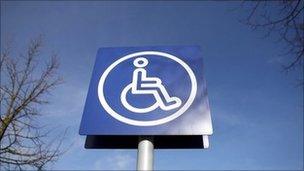Tests claim few benefit claimants 'unfit to work'
- Published

The assessments have been criticised by some charities and claimants
Only 7% of people claiming sickness benefits were unable to do any sort of work, new figures have shown.
New claimants of Employment and Support Allowance (ESA) must undergo tests to see if they are capable of some sort of employment.
Of 1.3 million tests between October 2008 and November 2010, some 88,700 were considered unfit for any work.
The TUC said the tests were a money-saving exercise, adding that disabled people were not "trying it on".
The Department for Work and Pensions figures come on the day a report warned tests caused anxiety among claimants.
Fitness
ESA is the successor to Incapacity Benefit and claimants are required to go through a series of tests to judge their fitness for work.
The department has released the results from 1.3 million tests over a period of more than two years which showed:
7% were incapable of any work
17% were able to do some sort of work given the correct support
39% were deemed to be fit for work and were moved onto jobseeker's allowance
36% dropped out of the application process
1% of applications were still in progress
"These figures show that many people are able to work with the right help. We have strengthened the support now available tailoring it to individual needs so they can overcome whatever barriers they face," said Work and Pensions Minister Steve Webb.
"Those who cannot work will always receive our unconditional support but for those who can work it is right that they get the help they need to get into employment.
"We are continuously improving the medical test to ensure that it is as fair and effective as possible."
But there has been some criticism of the tests.
"The new incapacity benefit assessment is a much tougher test than previously and is designed to save the government money by excluding more people," said TUC general secretary Brendan Barber.
"It is therefore unsurprising that more disabled people have been declared fit for work. These figures certainly do not suggest that thousands of disabled people are suddenly trying it on.
"The TUC has heard from disabled people all around the UK who feel the tests have been unfair and ineffective. The government needs to do much more to help disabled people back into jobs, rather than cracking down on the benefits they get when they are unable to work."
Vulnerable
The figures came as a report by the Work and Pensions Committee concluded that some vulnerable benefit claimants had payments stopped because of administrative errors in work assessments.
This affected some of the 1.5 million existing incapacity benefit claimants who are being reassessed with work capability assessments to encourage them back into jobs.
Overbooking of slots led to some people being marked as failing to attend, leading to suspended payments.
"The government's aim of helping benefit claimants back into work is laudable, but the scale of the challenge should not be underestimated and nor should the level of anxiety which surrounds the process," said Dame Anne Begg, who chairs the committee.
"People are suspicious that the government's only objective is to save money."
Tests
The reassessment process, which began nationwide in April, determines whether applicants are entitled to ESA, or are considered "fit for work", in which case they are put on jobseeker's allowance instead.
The assessments are carried out by Atos Healthcare. It was criticised in the committee's report, although the committee accepted that some improvements had been made.
"[The service] has often fallen below the standard claimants rightly expect. This has contributed significantly to the widely felt mistrust of the whole process," the report said.
It added that it was unacceptable that some people had found their benefits were stopped as a sanction for failing to attend the assessment when it was no fault of their own.
Cases had been the result of overbooking, administrative errors, or benefits claimants being too ill to attend the test.
Atos declined to comment on the report when contacted by the “óĻó“«Ć½.
The report called on the government to be more active in explaining the support available to people, irrespective of the outcome of the assessment.
It was also critical of the "irresponsible and inaccurate" media coverage of the issue which labelled some benefit claimants as "workshy".